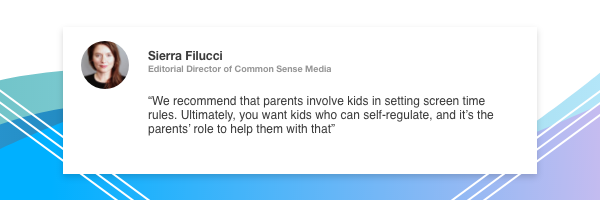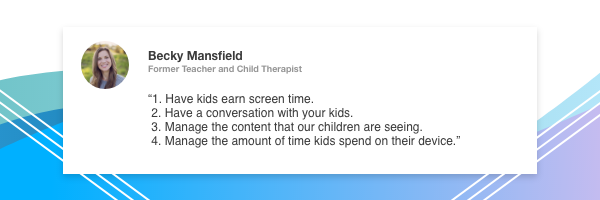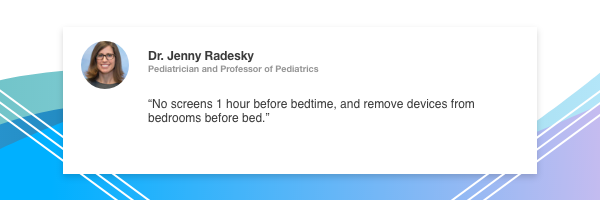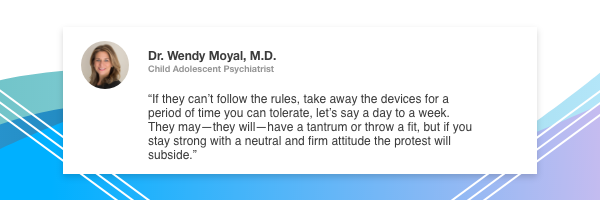Welcome to our expert-driven guide on establishing healthy screen time rules for kids! In today's digital age, children are immersed in screens from an early age, raising concerns about their well-being and development. To provide you with the most effective strategies, we've consulted with leading experts in child development, psychology, and technology. In this article, we'll share their invaluable insights and recommendations for managing screen time. With the right use of screens, you can foster a balanced and fulfilling digital experience for your children. But don’t take our word for it — read on to see what the experts said!
Childcare and Screen Time Experts We Talked to
To help parents determine which rules to set, InMyArea Resource compared screen time rules from nine experts:
- Sierra Filucci, former editorial director of Common Sense Media, current UX writer for Google's Kids & Family team
- Becky Mansfield, former teacher and current child development therapist
- Dr. Danelle Fisher, pediatrician
- Dr. Jenny Radesky, developmental behavioral pediatrician
- Dr. Wendy Moyal, M.D., child adolescent psychiatrist
- Kristin Carothers, Ph.D., clinical child psychologist
- Dr. Elizabeth Milovidov, Esq., e-safety expert and founder of Digital Parenting Coach
- Dr. Linda Papadopoulos, psychologist
- Laine Lipsky, parenting coach
Here’s what those experts had to say about screen time rules and your child!
Monitoring content
Most experts agree: Parents should know what their kids are doing online and have regular conversations about screen time.
Some experts also believe: Kids should be encouraged to monitor their own screen time.
Most experts recommend monitoring children’s media content. Parents can do this by watching a show or video with their child and checking out which apps and games they use the most.
Meanwhile, parents have plenty of programs at their disposal to help automatically monitor content. Whether that is the best approach is another issue. Many experts advocate for face-to-face discussions so parents can better understand why certain pieces of content appeal to their children. Discussions tend to be more educational and insightful than black-and-white software monitoring. Either way, whether you incorporate automatic monitoring or not, it’s important to have regular conversations about what your children watch and play (and how much).
Modeling good habits
Most experts agree: Parents should set a good example for kids.
Some experts also believe: Parents should follow the same screen time rules they set for kids.
Most experts agree that parents need to set a good example for their kids, even if it means parents follow the same screen time rules their kids do. Children who feel their parents are always on the phone can pick up conflicting messages. Even babies, from their young age, can learn screen time behavior from a parent.
Setting screen time usage limits
Most experts agree with AAP recommendations: Children 18 months and younger should avoid the use of screens other than for video chatting, children between 18 and 24 months can watch occasional, educational programming with caregivers, and children 2 to 5 years old should limit noneducational screen use to one hour per weekday and three hours per weekend day. Children 6 and older should have consistent limits and participate in healthy activities. The consensus for the 6+ age group is two hours maximum per day of noneducational screen time.
Some experts add to the above or take slightly different approaches, saying:
- Screens should be turned off when not in use, even if it’s just for background noise.
- Parents should allow screen time usage in blocks or ranges of time.
- Parents should encourage kids to monitor their own screen time and use monitoring tools to help interrupt themselves.
- Older children should be involved in setting screen time rules so they start learning to self-regulate with parents’ help.
- Children should earn their screen time with good behavior.
- Parents should follow the same screen time rules.
Most experts refer to AAP recommendations for screen time and content quality. For instance, video chatting with a grandparent is one example of a high-quality screen activity because of the connection a child is building with family.
Likewise, shows such as Sesame Street that promote learning about emotions, diversity, numbers, and letters are more useful for 3-year-olds to watch than shows geared toward adults. Similarly, children benefit more from screen time when their parents watch shows with them (or play games with them). Parents can discuss the content with their children before, during, and after watching/playing. (“Oh, I wonder what she will do next! Do you think he made a mistake? Let’s see if we can count to five now!”)
Some parents may prefer to separate screen time into 30-minute blocks or in time frames. Moreover, some experts suggest involving older kids in creating their own screen time rules. Sierra Filucci is one of the experts who encourage this type of involvement since children feel invested in the rules and are more likely to self-regulate. Involving children also encourages healthy conversation about how they spend their time in front of screens.

Other experts, such as Becky Mansfield, suggest making children earn screen time by finishing homework, completing chores, and doing other types of good behavior. This topic is highly debated. Many experts argue that rewarding a child with screen time is the same as rewarding a child with a candy bar, resulting in the child wanting it more. This may lead to the child asking, “If I put my toys away, can I get the iPad?”

Whichever screen time rules you set, it’s important to stay consistent. Avoid swinging between extremes such as not allowing screens one day and back to no limits the next day.
Screens at mealtime
Most experts agree: Screens should be turned off or put away during meals.
Dr. Danelle Fisher is among the mass of experts advising against meals in front of a screen. Screen-free family meals promote quality discussions between parents and children with everyone’s undivided attention. Toddlers who are used to having a screen as a distraction while being fed have a much harder time weaning off screens during meals. This change can be done gradually. You may try to have the TV on mute at first, or wait 10 minutes before putting away a screen if it helps children adjust.

Screens at bedtime
Most experts agree: Don’t allow screens after bedtime.
Some experts also believe: Turn off screens one hour before bedtime.
Most experts agree that screens should not be allowed after bed. This rule does get harder to enforce as children reach their teens, making it more important for parents to introduce it early on. Dr. Jenny Radesky and other experts also say to remove devices from the bedroom or shut them down an hour before bedtime. Screens emit blue light that suppresses melatonin which can make it harder to fall asleep.

Punishments for too much screen time
Experts do not agree and say:
- Screens should be taken away for a period that’s time limited and specific (e.g. one day or one week).
- Parents should avoid taking away screens as punishment.
- Parents should use other forms of punishment unrelated to screens.
Punishments for when children and teens refuse to get off a screen is one area in which experts have conflicting advice. Some studies have found that rewarding or punishing with screen time enhances its appeal. As a result, punishment can lead to more screen time usage later.
Dr. Wendy Moyal is among the experts who recommend taking away screens as a punishment if a child does not comply with screen time rules. Parents should communicate with the child ahead of time that it is the child’s decision, for example, “If you do not put away the phone, you lose privileges tomorrow.” By doing this, parents draw a direct line between not following screen time and the consequences.

Some experts suggest using forms of punishments unrelated to screens. For example, requiring your child to walk the dog before dinner for a week gets your child moving outdoors and away from screens.



